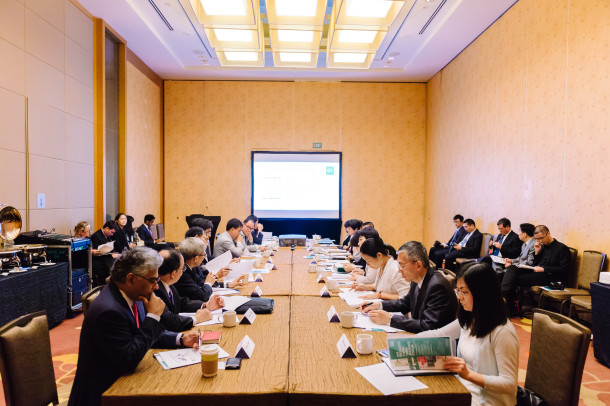 Secretariat General Metropolis
Secretariat General Metropolis
Seoul leads megacities future challenges and global alliances
It is hard to imagine the entire population of Netherlands, Chili or Australia living in only one city. Megacities are one of the most challenging phenomenons of the current urbanization debate and yet very little work or resources are committed to it at international levels. United Nations predicts, by 2030, the world is projected to have 41 mega-cities with 10 million inhabitants or more. Tokyo, Japan will remain the largest Megacity with 38 million plus inhabitants, closely followed by Delhi, India. It is also considered that, by 2030, over 8% of human population will be living in the top 40 Megacity regions.
During the establishment of the Metropolis International Training Institute (MITI) in Seoul, the former Metropolis Secretary General Mr LeSaux and Senior Advisor Mr Dubey initiated the dialogue of Megacities with the Seoul Institute. In July 2014, the Megacity Think Tank Alliance (MeTTA) was formally established with Metropolis as one of the founding members of this alliance. MeTTA aims to provide solutions to problems a megacity might face and subsequently to improve the quality of life of its citizens. As a founding member of MeTTA, Metropolis brings the network of cities to this forum and shares the common knowledge platforms to collaborate in addressing the challenges of megacities.
On the sidelines of the World Cities Summit in Singapore held in Singapore on July 12, the third MeTTa General Assembly took place and all its founding members and partners discussed the current challenges of Megacities of Asia and proposed activities of the alliance. The general assembly took the note of the current demands of megacities of the region and the effectiveness of MeTTa in establishing a collaboration platform where members can exchanges their knowledge and experiences in more effective way.
In addition to the third general assembly, the MeTTA organised a forum on mobility - Megacity Mobility Systems and Solutions, where peers and participants had an opportunity to share the best practices on megacity mobility systems. The forum was also aimed to provide city planners and policymakers innovative mobility solutions to achieve the optimal balance between efficient space use, equitable social design, and environmental benefits.
Metropolis senior advisor Mr Sunil Dubey presented a talk on Mobilising People in Megacities and role of Metropolis in connecting megacities of the world. The Metropolis presentation emphasised on the people centric megacities, where communities and mobility are intertwined by innovation in creating Connected Communities in megacities. He further presented evidence based examples to demonstrate the values of city to city learnings and knowledge exchanges to address the challenges of megacities in shortest possible time and limited resources. Projects and examples from Metropolis cities of Barcelona, Berlin, Montreal, Mexico city, Guangzhou, Seoul and Johannesburg were presented to qualify the Dr Tim Cambell’s assertion about ‘clouds of trust’ for city to city learning.
The MeTTa general assembly and forum was an opportunity for Metropolis delegation to interact with other founding members and partners including city of Beijing, Shanghai, Busan, Tianjin, CityNET and ICLEI.
The next MeTTA Forum is to be held in October 2017 in Megacity Shanghai, China.

